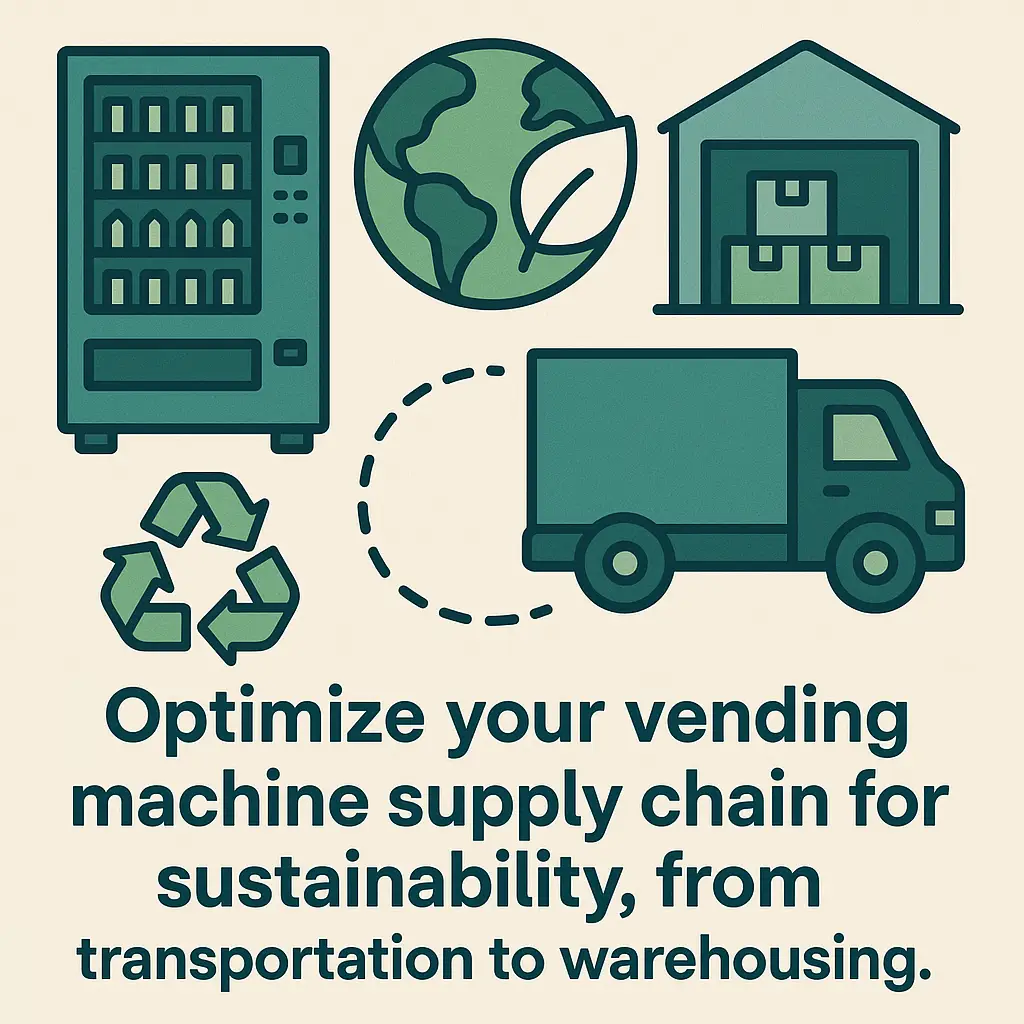Sustainable Supply Chains for Vending
Optimize your vending machine supply chain for sustainability, from transportation to warehousing. Reduce environmental impact every step of the way.
Back to Eco Friendly Vending ResourcesOptimize your vending machine supply chain for sustainability, from transportation to warehousing. Reduce environmental impact every step of the way.
Back to Eco Friendly Vending ResourcesImplementing sustainable supply chain practices in vending is crucial for minimizing environmental impact and meeting evolving consumer demands for responsible business operations.
![]() Reduce carbon footprint through optimized logistics
Reduce carbon footprint through optimized logistics
![]() Promote ethical sourcing and eco-friendly products
Promote ethical sourcing and eco-friendly products
![]() Minimize waste with efficient operations and recycling
Minimize waste with efficient operations and recycling

The vending industry is increasingly recognizing the importance of sustainable supply chains. From the journey of products to the energy consumption of machines, every step in the process offers an opportunity to reduce environmental impact. True sustainability in vending goes beyond just recycling old machines; it involves a holistic approach that considers product sourcing, transportation logistics, warehousing efficiency, and waste management. Businesses looking to enhance their corporate social responsibility (CSR) and appeal to eco-conscious consumers are actively seeking vending solutions with robust green credentials.
A sustainable vending supply chain begins with responsible sourcing. This means prioritizing products from local suppliers whenever possible, which significantly reduces transportation emissions. Furthermore, selecting items that are organic, Fair Trade certified, or produced with minimal water and energy can bolster a company's sustainability profile. Packaging also plays a crucial role; opting for items with recyclable, compostable, or reduced packaging materials directly contributes to waste reduction. For more details on eco-friendly product options, you might explore eco-friendly products in vending machines.
Transportation is often a major contributor to a supply chain's carbon footprint. For vending, this means optimizing delivery routes to minimize fuel consumption and emissions. Route optimization software, consolidating deliveries, and scheduling services during off-peak hours can dramatically cut down on environmental impact. Increasingly, vending operators are also exploring the use of electric or hybrid vehicles for their fleets, particularly for urban routes. This focus on efficient logistics doesn't just save the planet; it reduces operational costs in the long run. Understanding efficient cooling systems also plays a part, as detailed in low-power cooling systems in vending machines.
Warehouses serve as critical hubs in the vending supply chain. To make them sustainable, businesses can implement energy-efficient lighting (like LEDs), optimize heating and cooling systems, and choose renewable energy sources where available. Effective inventory management, bolstered by technologies like telemetry, is also vital. By accurately tracking stock levels and predicting demand, operators can minimize spoilage and overstocking, which in turn reduces waste. This proactive approach to managing inventory ensures that resources are used efficiently. Further insights into overall vending machine sustainability can be found in sustainability across vending machine life cycle.
Finally, a sustainable vending supply chain considers the entire lifecycle of a product and machine. This involves comprehensive waste management programs at all points – from the warehouse to the machine's location. Encouraging consumers to recycle packaging by providing convenient bins and stocking machines with recyclable containers is key. For the machines themselves, an emphasis on durability, repairability, and responsible end-of-life recycling practices ensures that materials are recovered and reused, minimizing landfill waste. Many modern machines are designed with energy efficiency and longevity in mind.
It refers to optimizing every step of a vending supply chain—from sourcing to distribution and waste management—to minimize environmental impact and promote ethical practices.
It reduces carbon footprint, minimizes waste, promotes responsible sourcing, and appeals to environmentally conscious consumers and businesses.
This can involve optimizing delivery routes, using fuel-efficient vehicles, considering electric or hybrid delivery vans, and consolidating shipments to reduce overall mileage.
Sustainable warehousing includes using energy-efficient lighting and cooling, optimizing storage layouts to reduce retrieval times and energy, and proper waste segregation and recycling programs.
This involves prioritizing local suppliers to reduce transport emissions, choosing products with eco-friendly certifications, and selecting items with minimal or recyclable packaging.
Yes, telemetry for real-time inventory management, route optimization software, and energy-monitoring systems for machines and warehouses all contribute to efficiency and sustainability.
While some sustainable investments may have upfront costs, they often lead to long-term savings through reduced fuel consumption, lower energy bills, and decreased waste disposal fees.
'Last-mile' refers to the final leg of delivery to the vending machine. Sustainability here means efficient route planning, smaller, electric vehicles where feasible, and strategic placement to minimize travel.
It encompasses reducing product waste through demand forecasting, ensuring proper disposal and recycling of machine components, and promoting the use of machines that accept recyclable packaging.
Absolutely. Many businesses and consumers prioritize sustainability, making eco-friendly vending a competitive advantage and a way to align with corporate social responsibility goals.